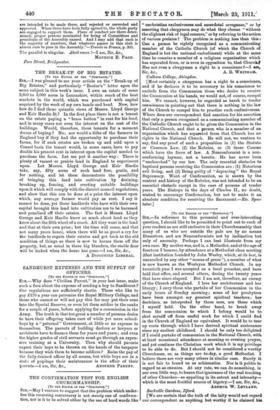THE CONFIRMATION TEST FOR ENGLISH CHURCHMANSHIP. [To THE EDITOR OP
THE " SPACTATOR."] Sin,—May I venture to suggest that the problem which under- lies this recurring controversy is not merely one of confirma- tion, nor is it to be solved either by the use of hard words like
" unchristian exdusiveness and sacerdotal arrogance," or by asserting that clergymen may do what they choose " without the slightest risk of legal censure," or by referring to the action of various prelates P The problem is nothing less than this : Can a person be rightly recognised as a, communicating member of the Catholic Church (of which the Church of England is but the national embodiment) while at the same time he remains a member of a religious organisation which has separated from, or is even in opposition to, that Churoki Has not even a clergyman a right to a conscience P—I am,
[Most certainly a clergyman has a right to a conscience, and if he declares it to be necessary to his conscience to exclude from the Communion those who desire to receive the Communion at his hands, we would not, of course, compel him. We cannot, however, be regarded as harsh to tender consciences in pointing out that there is nothing in the law of the Church to compel him to practise such exclusiveness. Where does our correspondent find sanction for his assertion that only a person recognised as a communicating member of the Catholic Church ought to be given the Communion in the National Church, and that a person who is a member of an. organisation which has separated from that Church has no rights in the National Church. He will not, we venture to say, find any proof of such a proposition in (1) the Statute or Common Law, (2) the Rubrics, or (3) those Canons which have the force of law. A Nonconformist is a non- conforming layman, not a heretic. He has never been "unchurched by our law. The only essential obstacles to baptised persons receiving the Communion are : (1) Notorious evil living, and (2) Being guilty of " depraving " the Royal Supremacy. Want of Confirmation, as is shown by the context and history of the Rubrics, was not intended to be an essential obstacle except in the case of persons of tender years. The Bishops in the days of Charles II., no doubt, wished to encourage Confirmation, but not to make it an. absolute condition for receiving the Sacrament.—ED. Spec- tator.]










































 Previous page
Previous page